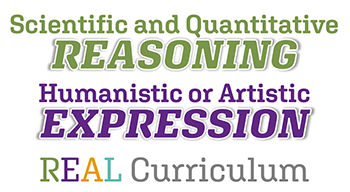Philosophy and Religious Studies
- Army ROTC
- Women's & Gender Studies
- School of Communication
- Interdisciplinary Humanities Research Lab
- Wicked Initiatives
- Department of English
- Interdisciplinary Studies
- Philosophy and Religious Studies
- Department of Criminal Justice
- Foreign Languages and Literatures
- Psychology
- SMART Lab
- Law
- Department of History
- Department of Political Science
- Center for Police Practice, Policy and Research
- Sociology
Minor in Science and Values
Overview
Custom-designed for students in the natural sciences, humanities, and social sciences, the Science and Values Minor combines perspectives to analyze the ways that scientific and technological change affect the texture of human life, social relations, and our relationship to nature.

The Science and Values Minor satisfies the "R" Scientific and Quantitative REASONING Area and the "E" Humanistic or Artistic EXPRESSION Area of the REAL Curriculum.
The Science and Values Minor will help you to:
- Examine ethical issues in science and technology
- Contribute to public policy debates over emerging technologies
- Analyze human impacts on nature
- Analyze social and cultural impacts of scientific research and discovery
The Science and Values Minor can help you for life after graduation in areas such as:
- Preparing for law school or medical school
- Preparing for work in science journalism
- Building skills for nonprofit, public policy, or social services careers
Curriculum
Minor Requirements (18-21 credits)
Required Courses (3 credits)
- PHIL 342 - Philosophy, Science, and Values (WI)
Philosophical Perspectives (6 credits)
Choose two of the following:
- PHIL 115 - Wicked Problems (GE)
- PHIL 213 - Critical Reasoning and Argumentation (GE)
- PHIL 215 - Healthcare Ethics (GE)
- PHIL 219 - Environmental Ethics (GE)
- PHIL 310 - Professional Ethics (WI) (GE)
- PHIL 430 - Advanced Healthcare Ethics
Multidisciplinary Perspectives I (6-8 credits)
Choose two of the following:
- ANSC 101 - Anthropology of the Human Past (GE)
- ANSC 203 - Bigfoot Stole My UFO!: Critically engaging with Science, Pseudoscience, and the Paranormal (WI) (GE)
- ASTR 120 - General Astronomy (GE)
- BIOL 111 - Integrative Biology I (GE)
- CHEM 111 - General Chemistry I (GE)
- GEOL 120 - Earth Science and Society (GE)
Multidisciplinary Perspectives II (3-4 credits)
Choose one of the following:
- ANSC 301 - Principles of Archaeology (GE)
- ANSC 302 - Principles of Biological Anthropology (GE)
- BIOL 340 - Science in Culture and Society (GE)
- FOSC 301 - Survey of the Forensic Sciences (GE)
- MATH 306 - Mathematics of Democracy